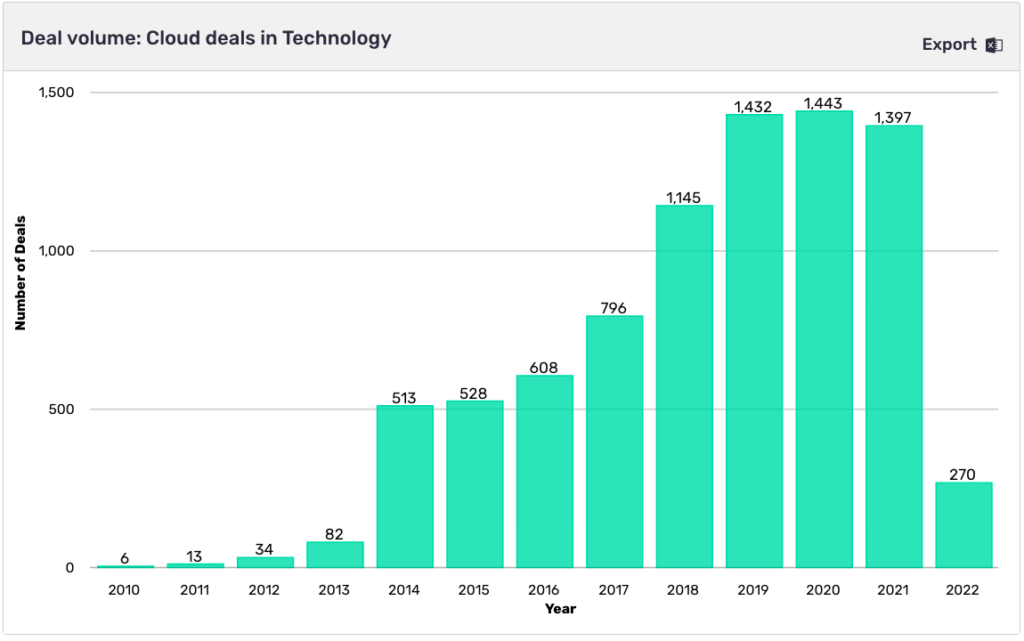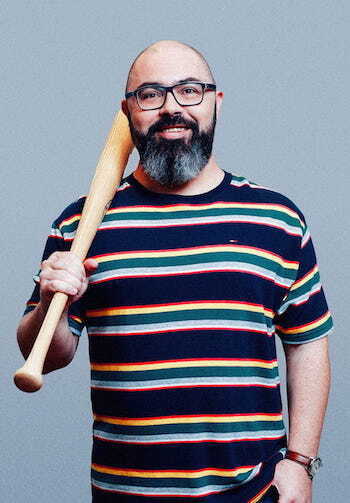
Vadim Solovey is the CTO of DoiT International, the cloud service management provider. The Santa Clara, California startup was founded in 2011 and has raised over $100m to date.
DoiT International acquired ProdOps, an Israeli cloud services company and provider of scalable software operations and infrastructure automation services, in February 2021.

Access deeper industry intelligence
Experience unmatched clarity with a single platform that combines unique data, AI, and human expertise.

It shouldn’t surprise anyone that DoiT International has grown, given how cloud technology has become a huge issue keeping business leaders up at night.
According to GlobalData’s data, the number of cloud venture funding deals have jumped from 513 deals $21.16bn in 2015 to 1,397 deals worth $212.16bn in 2021.
In the latest Q&A in our CTO Talks series, the DoiT International CTO explains why he dislikes social media, why he believes virtual reality is overrated – no matter what Mark Zuckerberg thinks – and the life he could’ve had.

Tell us a bit about yourself – how did you end up in your current role?
Vadim Solovey: My professional history began in 1995 as a software engineer. After a few years, I co-founded a company that built complex data centres for big organizations. After about eight years at this company, in 2006, Amazon launched AWS. It was a threat at first – but its inception represented a big shift in the technology landscape. I fell in love with the cloud computing founding principles such as “elasticity”, “use on-demand”, “infinite scalability”, etc. and even tried to “replicate” some of them in our own tech stack.
We sold the company and I eventually left in 2010. Afterwards, I was surprised to discover that as the public cloud matured, some of the founding principles had somewhat changed, and not always for the best. My current mission as CTO and co-founder of DoiT International, is to build technology and products that will deliver the true promise of the cloud.

US Tariffs are shifting - will you react or anticipate?
Don’t let policy changes catch you off guard. Stay proactive with real-time data and expert analysis.
By GlobalDataWhere did your interest in tech come from?
That’s actually quite a story. When I was a teenager in the mid-80s, I worked during the summers with the goal of buying a motorbike. I had an agreement with my parents that they would double whatever I ended up earning, which should have been just enough to buy the motorbike. At the end of the summer, my mom told me that after careful consideration, they wouldn’t support me with buying a motorbike. Instead, they offered to buy me a personal computer, and allow me to keep the money I had earned myself. I was quite upset with this at first, but eventually agreed. Very soon, I was spending days (and sometimes nights) with my new PC and that’s how my story with tech started.
What one piece of advice would you offer to other CTOs?
That’s a bigger question than it may seem. For me, it’s all about the focus. Focus on one big problem at a time until it is solved. Be ready to take risks or make bold decisions. And maybe the most important advice: learn how to stop if the problem cannot be solved. The latter is often easier said than done.
What’s the most surprising thing about your job?
DoiT is in a hyper-growth state, doubling in size every 10-12 months. Having been with the business from the start, I’ve learned the hard way how challenging it can be to make sure everyone in the organization is aligned on the same goals when we’re growing at this pace. It often feels as though my real job is to sell the company vision to new starters. Part of my job is to productise the onboarding experience, and a lot of my time is being spent on making sure we work as one “machine” acting as a sort of a “kapellmeister” to orchestrate these processes.
What’s the biggest technological challenge facing humanity?
Climate change is a big challenge for humanity. No matter the reasons, the climate is undeniably changing and our childrens’ children will face problems that we need to start solving now. I believe we can avoid a catastrophe if we take the right steps to reduce emission levels and find ways to adapt to a warmer world. It’s also a problem of social responsibility, because the world’s poorest people who are contributing the least to climate change, will suffer the worst.
Public cloud providers deliver significant energy and carbon emissions reduction potential when compared with traditional data centres. Many studies suggest the public cloud can deliver overall energy efficiencies of over 90 percent and will therefore play a significant role in helping us achieve a net zero economy and minimise the adverse impact of the way we live and work on the planet.
What’s your biggest technology pet peeve?
For me, it’s social media and how much time many people spend using it. It’s a relatively new problem but it’s taking a toll on our kids. Social media companies are currently not doing enough to solve this problem, and I think companies like Apple, Amazon or Google have a better shot at resolving this issue.
What’s the most overrated technology out there?
Virtual or augmented reality. We are still quite far from seeing a decent level of implementation. I am also somewhat worried about the social implications of a massive rollout of this technology – with the potential to drive a disconnect between our consciousness and reality.
What technology are you the most excited about right now?
For me it’s the mRNA technology. Covid-19 has shown us what it’s capable of delivering in a very short space of time. In this space, there are companies working to bring personalized cancer drugs to market, directing the body’s own immune system to destroy cancerous cells by identifying mutations that are specific to each tumour. The big challenge for this life-saving technology is developing the drugs at scale, as each one requires a tumour biopsy and DNA sequencing before the medicine can be made. Sequencing DNA is a very compute-intensive task, but with the cloud able to provide access to vast amounts of computing resources, this process can be both expedited and run at a scale that can deliver real results for the huge numbers of those affected by cancers around the world.
What’s the strangest thing you’ve ever done for fun?
I learnt to play poker so I could participate in the game while my friends were playing. I am awfully bad at this game.
What’s the most important thing happening in your field at the moment?
Public cloud migrations. They can reduce carbon dioxide emissions by up to 59 million tons per year—the equivalent of having 22 million fewer cars on the road! This is an important cloud trend that will only become more important in years to come.
In another life you’d be?
Probably a farmer. There is something very deep in our connection as humans with the soil, plants, and animals.







